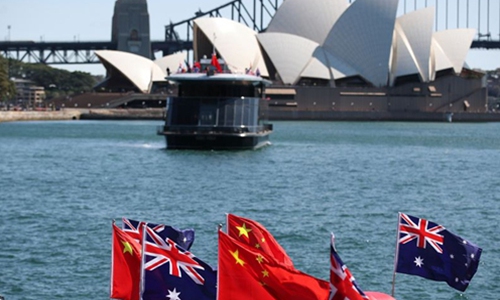Australia and China must reset road map to normalcy
By Mark Beeson Source:Global Times Published: 2020/5/21 18:53:42

Chinese and Australian national flags are seen at an event in Sydney, Australia, September 8, 2019. Photo:Xinhua
The relationship between Australia and China has rarely been in worse shape. Given that both countries derive significant benefits from getting the relationship right, it's worth asking how things went so wrong and what can be done to put things right.
At one level, nobody is to blame. Even though some health specialists have worried and warned about the possibility of major pandemics, it's fair to say that no country was well prepared for the scale and impact of the current crisis. At times of immense, life-threatening stress, people don't always act effectively or sensibly.
Given Australia's well-known economic dependence on China as its principal export destination, Australian Prime Minster Scott Morrison's high profile calls for an investigation into the origins of the coronavirus pandemic are surprising, especially as they have clearly infuriated Chinese people.
Many in China have simply dismissed Morrison as an American stooge who is seeking to shore up Australia's position as a trusted and uncritical ally. While there may be something in this, it would be foolish and inaccurate to dismiss the growing sense of distrust that is emerging among Australian political elites and even the population more generally about relations with China.
This is unfortunate, not least because millions of Chinese students have studied in Australia and seen for themselves that the locals are generally not anti-Chinese. On the contrary, many have actually become informal advocates for Australia and the benefits of good relations. Little wonder that China is now Australia's largest source of immigration.
And yet the formal bilateral relationship is increasingly fraught and characterized by threats and posturing. There's no doubt that China has enormous potential geo-economic leverage over Australia. But for a country that prides itself on playing a long game, driving Australia - and other nervous regional states - further into the arms of the US doesn't look like a good move.
Indeed, if ever there was a moment for China to actually improve its international standing and reputation, this is it: even Australians think that the Trump administration is erratic and unreliable.
US's handling of the coronavirus pandemic has rightly been condemned as chaotic and disastrous. It has further undermined the standing and reputation of a country that still regards itself as exceptional. Perhaps it is, but increasingly for all the wrong reasons. China, by contrast, has demonstrated a remarkable capacity to get to grips with an existential crisis.
There are, however, important lessons to be learned about the way all countries have handled this crisis. No country's response has been flawless, although plainly some have been much worse than others. Developing a clear collective understanding of what went right and what went wrong is, therefore, essential if we are not to repeat the same mistakes in the future.
This should be the essence of an independent investigation into the origins and evolution of the coronavirus. The stakes are too high for countries to lose sight of the big picture and descend into petty name calling. Every one of the big issues that the human race confronts - pandemics, climate change, not to mention maintaining the peace - necessitates greater degrees of cooperation, not less.
Australian policymakers, like their counterparts everywhere, endlessly invoke the idea of the "national interest" to justify whatever policy they happen to be promoting. It was ever thus, perhaps. But now things really are different. The business community in Australia has been diligently pointing out to the government just how much damage ill-considered remarks can cause and how vulnerable Australia is to retaliation.
But it is not just middle powers such as Australia that need to think carefully about the impact of their actions on their neighbors. Even great powers like China need to recognize that bluster is invariably counter-productive. Nothing is more likely to compel any country to rethink its policies than the possibility that their major trade partner is not reliable.
Trade interdependence is generally a good thing and one associated with greater cooperation, understanding and the promotion of peace. But as the Great Depression reminds us, when it breaks down, the consequences can be apocalyptic. Cool heads need to prevail at moments of crisis. Resetting the relationship between Australia and China would be a good step on the road back to normality.
The author is a professor of international politics at the University of Western Australia. opinion@globaltimes.com.cn
Posted in: ASIAN REVIEW